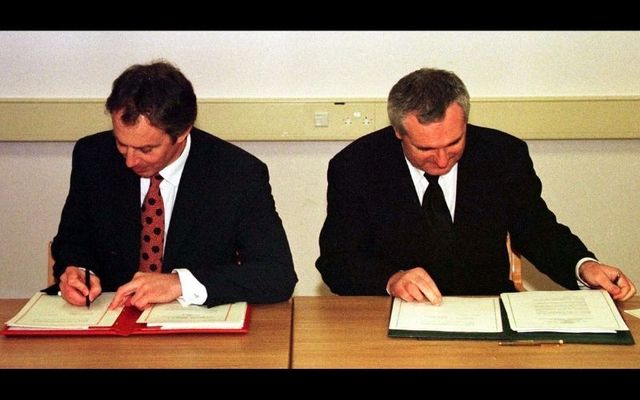Politicians marked 24 years since the Good Friday Agreement was signed on April 10, 1998. The accord helped bring an end to The Troubles and laid the foundation for power-sharing in Northern Ireland.
It also set out the framework for greater cooperation between the governments of Ireland and Northern Ireland and the continued consultation between the British and Irish governments.
The agreement was signed on April 10, Good Friday, 1998, after talks chaired by United States Special Envoy George Mitchell and overseen by Secretary of State for Northern Ireland Mo Mowlam.

April 9, 1998: Secretary of State for Northern Ireland Dr Mo Mowlam in upbeat mood as she arrives for the final day of the peace talks in Stormont Castle. (RollingNews.ie)
Bertie Ahern of Fianna Fáil was Taoiseach at the time, while Tony Blair was the British Prime Minister.

April 10, 1998: Taoiseach Bertie Ahern, Senator George Mitchell, and British Prime Minister Tony Blair at Castle Buildings Belfast, after they signed the peace agreement that will allow the people of Northern Ireland to decide their future. (RollingNews.ie)
Commenting on the anniversary, both Taoiseach Micheál Martin and Foreign Affairs Minister Simon Coveney stressed the importance of the milestone against the backdrop of the conflict in the Ukraine.
In a statement, Martin said the war in Ukraine was “a stark reminder that we cannot take democracy and peace for granted.”
"We have been united on the island of Ireland in our revulsion at Russian aggression and in our support and solidarity for the people of Ukraine," he said.
"It is incumbent on us all to protect and nurture the Good Friday Agreement which marked a seismic milestone in the lifetime of this island.”
Coveney added, "As the world watches continuing horrors unfold in Ukraine, this anniversary reminds us of how far we have come, how profoundly precious peace is and of the power of democracy."
Minister @simoncoveney marks the 24th anniversary of the Good Friday Agreement. Full statement ? https://t.co/ssoj3ELGH7 pic.twitter.com/Yu3XCzN3Xh
— Irish Foreign Ministry (@dfatirl) April 10, 2022
Ahead of the Assembly elections next month following a turbulent few years for Stormont, SDLP deputy leader Nichola Mallon cited the agreement in highlighting what democracy can achieve.
"Too often too many of us believe that change here isn't possible, with some people so fed up they're considering not voting," she posted on Twitter.
"When you are fed up, is exactly the time you should be voting. Change was possible 24 years ago. It's possible again but you have to vote for it."
Too often too many of us believe that change here isn't possible, with some people so fed up they're considering not voting. When you are fed up, is exactly the time you should be voting. Change was possible 24 years ago. It's possible again but you have to vote for it. https://t.co/pmNj0H8g6O
— Nichola Mallon (@NicholaMallon) April 10, 2022
The SDLP, led by the late John Hume, was one of the main political parties to the agreement.

April 9, 1998: The leader of the SDLP John Hume, arrives for the final day of the peace talks in Castle Buildings, Belfast. Talk were due to finish by the midight deadline but continued on to Good Friday afternoon. (RollingNews.ie)
Current party leader Colum Eastwood said it was important to continue the work of his predecessors.
"The Good Friday Agreement was a victory for the peacemakers and an offer of hope to my generation," he said. "Twenty four years on we have yet to live up to its full potential but we have to keep trying."
The Good Friday Agreement was a victory for the peacemakers and an offer of hope to my generation. 24 years on we have yet to live up to its full potential but we have to keep trying.
— Colum Eastwood ?? (@columeastwood) April 10, 2022
Sinn Féin was one of the parties that backed the agreement, with only the Democratic Unionist Party opposing the accord.
Sinn Féin's leader in the North, Michelle O'Neill, said that the agreement showed what can be achieved when parties work together.
"The Good Friday Agreement is the basis for deepening peace, political stability and reconciliation on the island of Ireland, and between Ireland and Britain," she said.
"This anniversary allows us an opportunity to reflect upon how far we have come, the journey of transformation that we have all traveled.”
Today marks 24 years since the Good Friday Agreement. We must make politics work and keep moving forward. All political leaders should commit to going back into govt immediately after the election and work together to tackle the cost of living crisis and fix the health service.
— Michelle O’Neill (@moneillsf) April 10, 2022
British Prime Minister Boris Johnson said the signing of the agreement was a “momentous moment for peace” that transformed Northern Ireland into a “thriving and dynamic part of the U.K.”
He added, "24 years on this progress cannot be underestimated or undermined."
The signing of the Belfast/Good Friday Agreement was not only a momentous moment for peace but has transformed Northern Ireland into the thriving and dynamic part of the UK we see today.
24 years on this progress cannot be underestimated or undermined.
— Boris Johnson (@BorisJohnson) April 10, 2022
*This column first appeared in the April 13 edition of the weekly Irish Voice newspaper, sister publication to IrishCentral.




Comments